The wild mountainous areas of Northern Thailand known as “The Golden Triangle” are slowly losing their tainted reputation as that of illegal Opium Production, and are now starting to flourish as high quality vineyards, producing top quality Thai wines
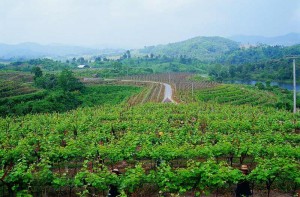 Thailand is known worldwide for its stunning beaches, islands & friendly people, but to consider that it could ever be perceived as a source of fine wines even just a few years ago would have been seen as fanciful to say the least.
Thailand is known worldwide for its stunning beaches, islands & friendly people, but to consider that it could ever be perceived as a source of fine wines even just a few years ago would have been seen as fanciful to say the least.
But that is all changing, not too far from the Northern Thailand city of Chiang Rai situated on the beautiful hills of the Mae Chan Valley lies the Mae Chan Winery, surrounded by a backdrop of hills covered with rows of neatly organized terraced vineyards.
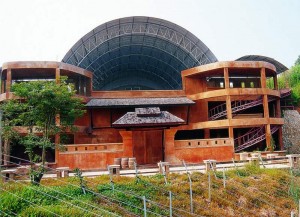
During the 1980’s, the early pioneers of Thai wine production spent many labored weeks & months scouring the Kingdom for areas 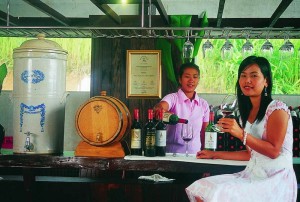 that best offered the ideal climate, drainage & location to produce the best quality grapes. The mountains that cover the complete area of Northern Thailand proved ideal and the first vines were planted & vineyards established.
that best offered the ideal climate, drainage & location to produce the best quality grapes. The mountains that cover the complete area of Northern Thailand proved ideal and the first vines were planted & vineyards established.
As the old adage goes “you can’t hurry a fine wine”, and that has certainly been the case with the Thai wines, by a prolonged process of trial & error covering a period of just over 10 years, Thai wines are now beginning to receive the global recognition they now deserve.
The Mae Chan Winery was the brainchild of Suphot Tangvitoontham a Thai-Chinese gems tycoon with a penchant for oenology, which is the science of grape vinification and wine preservation. He began importing Australian wines in the mid-1990s, and it was during his travels to the wineries of Southern Australia, that he noted the similarities in the climate between that part of Australia and that of Northern Thailand, which suggested that by finding suitable land for a winery at home in Thailand, he could produce the fine wines he had been previously sourcing abroad.
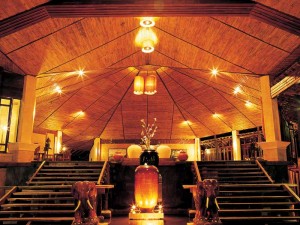 Thirteen years after searching for “the ideal site”, Mae Chang Winery now takes pride of place in the Mae Chang Valley, it now extends to over 1,300 rai(5,200 acres) of hilly land which also includes Doi Hom Fha, a 23-room, boutique villa-style resort and spa that extends over one of the hills, the resort is not actively promoted but offers perfect solace for people who love the beauty of the natural surroundings, there are also “soft” adventure activities available for visitors.
Thirteen years after searching for “the ideal site”, Mae Chang Winery now takes pride of place in the Mae Chang Valley, it now extends to over 1,300 rai(5,200 acres) of hilly land which also includes Doi Hom Fha, a 23-room, boutique villa-style resort and spa that extends over one of the hills, the resort is not actively promoted but offers perfect solace for people who love the beauty of the natural surroundings, there are also “soft” adventure activities available for visitors.
Visitors to the winery can look across the terrace of Doi Hom Fha to the tea plantation on the slopes of a nearby hill, and to rice fields, and orchards and experimental gardens where cold-climate fruit and vegetables are grown. “The rice and vegetables served at Doi Hom Fha restaurant all come from our own plantations,” Suphot explains. “So, you can be sure that they’re pesticide-free.”
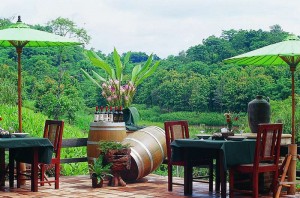 Traditionally, pesticide-free wines are considered Organic Wines and are some of the healthiest wines in the world.
Traditionally, pesticide-free wines are considered Organic Wines and are some of the healthiest wines in the world.
The fields extend across the hills and down into the valleys almost to the shores of the lake, where the water is like a great mirror reflecting the clouds and the blue of the open sky. The terraced tea plantations are quite breathtaking.
Rice wine? Checked. Herbal wine? Checked. Fruit wine?Checked. Thailand makes all of these but what about “proper” wine produced from the classical grape? The answer, again, is yes. Most visitors do not, perhaps, think of Thailand as being a wine producing country but, in fact, the viticulture industry is growing steadily. Thai wine, from homegrown grapes, is now being featured on wine-lists at quality Thai hotels and restaurants and is being increasingly exported to international markets. Of course it will take some time to build the international trust on Thai wines.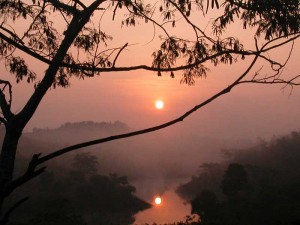
But, it all began some thirty years ago when His Majesty King Bhumibol had the idea that grape growing, for both wine production and dining-table use, might be feasible as one of his Royal Projects. So the King gave encouragement to specialists at Chiang Mai’s Royal Project Foundation and at Kasetsart University in Bangkok. From those tiny beginnings, and after many trial and error experiments with classical grapevine stock, the industry has grown to the level where Thai wines are being successfully presented at International Trade Fairs.



 0
0